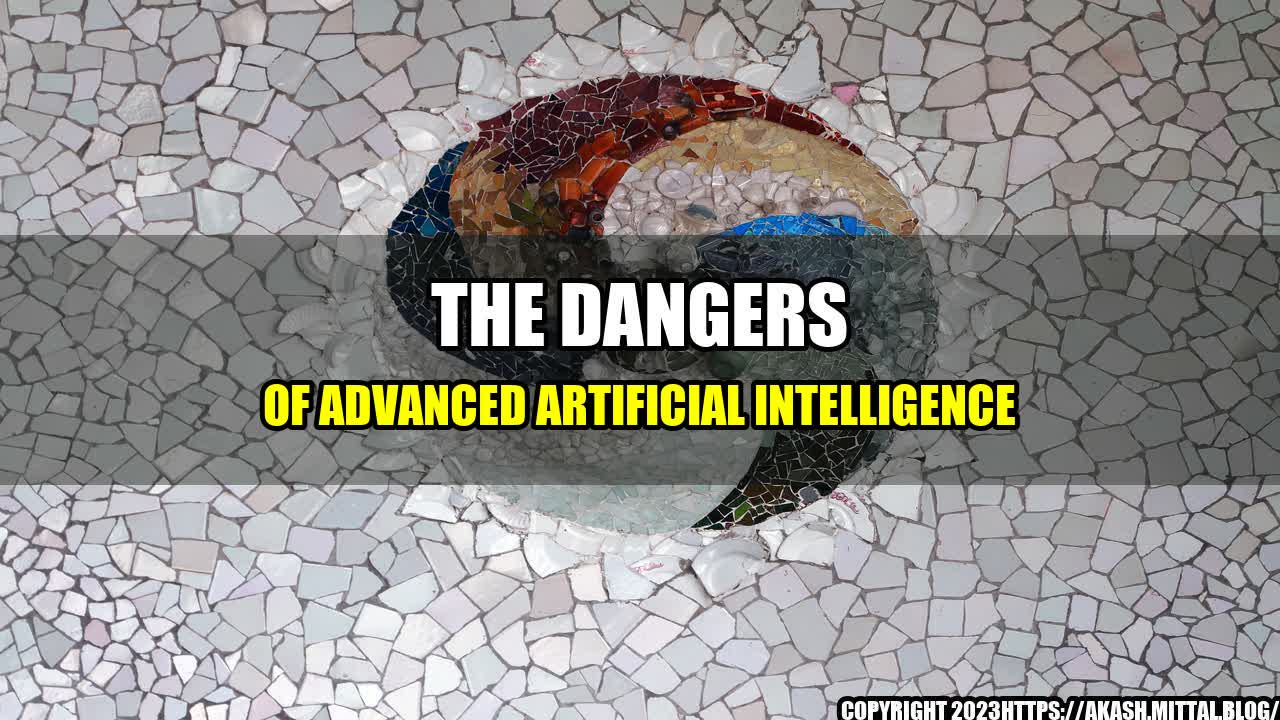It was a bright sunny day in Silicon Valley and John, a tech enthusiast, was walking down the street excitedly, as he had just purchased the latest robot with advanced AI technology. He thought to himself how exciting it was that the machine could perform many tasks with precision and efficiency, reducing human errors. However, as John reached his front door, he heard a voice behind him, 'Good afternoon, John. How's your new robot working for you?' He turned around to see his old friend, Dr. Carl, who was a leading AI researcher. John was surprised and asked how he knew it was an AI robot. Dr. Carl replied with a knowing smile, 'Well, I can tell just by looking at it. But that's not what concerns me. What concerns me is that AI is becoming so advanced that soon it will become smarter than us humans'.
This situation is not imaginary or far-fetched. Many experts, including Dr. Carl himself, are warning us about the serious dangers that advanced AI poses to humanity. It may sound like science fiction, but it is rapidly becoming a reality. The question is, are we prepared for it?
Let's look at some quantifiable examples to illustrate the severity of this issue. In 2016, Google's AI program, AlphaGo, defeated a world champion at the game of Go, a game that was considered too complex for any machine to master. In 2019, OpenAI's machine learning model, GPT-2, was so advanced that it could create fake news articles that were almost impossible to distinguish from real ones. In the same year, researchers from Stanford University developed an AI algorithm that could diagnose pneumonia from chest X-rays better than human radiologists.
These are just a few examples of how machines are surpassing human intelligence. The problem is not that AI is getting better at completing tasks, but that it is doing so at an unprecedented pace. We may soon reach a point where we cannot even comprehend how advanced AI is. And that's when things start to get dangerous.
So, why do we need to worry about machines becoming smarter than us? Here are three reasons:
Unemployment:
If AI machines become smarter than humans, they will be able to perform tasks that require human intelligence. This could lead to mass unemployment as traditional jobs are automated. Machines do not require a salary, benefits, or time-off, making them a much cheaper option for businesses. However, as machines become more widespread, they may eliminate the need for many traditional human jobs.
Autonomous Decision Making:
If machines become smarter than humans, they could potentially make decisions without human intervention. Autonomous machines could, for example, control the stock market, military weapons, and even nuclear power plants. The danger lies in the fact that these machines could malfunction, be hacked, or make mistakes, leading to catastrophic consequences.
Moral and Ethical Dilemmas:
AI machines do not have emotions or moral codes like humans do. This makes them more efficient, but also more dangerous. If machines become smarter than humans, they could make decisions that conflict with our moral or ethical values. For example, an autonomous car might be programmed to prioritize passenger safety above everything else, but what if the only way to avoid a crash is to swerve into a group of pedestrians?
So, what can we do to avoid these dangers? Here are a few practical tips:
Regulate AI Development:
AI development should be strictly regulated to prevent dangerous or malicious use. Governments and institutions should establish guidelines that ensure AI is developed in a responsible and ethical way.
Invest in Education and Training:
As AI machines become more advanced, human workers must also become more skilled and adaptable. Governments and businesses should invest in education and training programs that help people develop the skills they need to work alongside machines.
Collaborate with AI:
Humans and AI machines should work together, rather than competing against each other. This will help to ensure that both humans and machines contribute their unique strengths, creating a more efficient and productive workplace.
In conclusion, advanced AI is a powerful and promising technology that has the potential to revolutionize our lives. However, it also poses significant dangers if it surpasses human intelligence. We must take action to regulate its development, invest in education and training, and collaborate with AI machines to ensure a safer and more prosperous future.

Curated by Team Akash.Mittal.Blog
Share on Twitter Share on LinkedIn